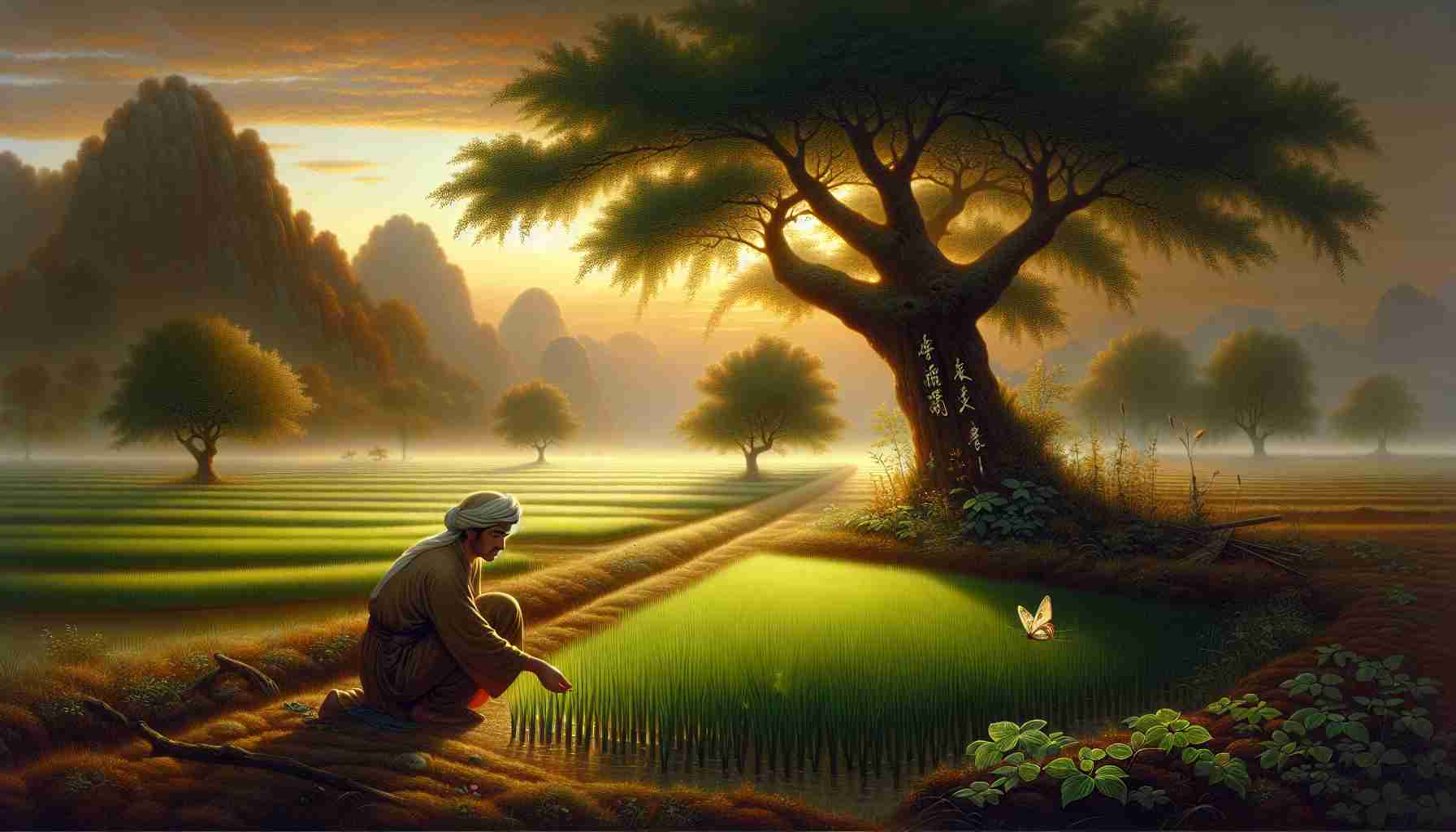

The wind was soft that morning. It carried the smell of the earth and made the leaves dance. I bent down to pat the soil of my little field. The sprouts were slow—too slow, it seemed. “Grow,” I whispered. “Grow faster.”
My name is Gao, and I was a farmer’s son. Every day, I helped my father in the fields outside our village. We raised rice and cabbage and melon. My father said everything had its season. But I didn’t believe him, not really. I thought if I worked harder—pulled weeds faster, watered more, shouted louder—the plants would listen.
One day, I woke up early. Too early. The moon still hung in the sky like a forgotten lantern. I ran outside and looked at the young rice shoots standing in the water. They were so small. I frowned.
“Maybe if I tug each one just a little,” I said to myself, “I could help them grow.”
So I pulled. Just a little. Plant by plant, I gave each shoot a gentle tug upward. “There,” I said as I stood back. They looked taller already. I was proud.
But when I returned the next morning, the plants were brown. Weak. Some had fallen over.
“What have you done?” my father said. His voice was low, not angry—just sad.
“I tried to help,” I said. “They weren’t growing fast enough.”
He knelt beside the withered plants. “Gao,” he said, “the rice was already growing. You didn’t need to force it. Everything in nature follows its own way.”
I looked at the tired plants and felt the tears sting my eyes. “I ruined them. I just wanted them to hurry…”
My father placed his hand on my shoulder. “There is a story,” he said softly, “from a sage named Liezi. He tells of a man who had a dream he was a butterfly. When he woke, he didn’t know if he was a man who dreamed he was a butterfly—or a butterfly now dreaming he was a man. The world flows on its own, Gao. We don’t always need to understand or control it. Sometimes, we must simply let it be.”
We sat there in silence as the sun warmed the field. I looked at the remaining plants—alive, steady, untouched.
That afternoon, I sat under the old plum tree and watched the leaves fall. They didn’t try. They didn’t rush. And yet, they danced all the same.
From that day on, I worked differently. I didn’t push. I helped when help was needed, but I didn’t try to force things anymore. I learned to listen—to the wind, the water, and the quiet voice inside me.
I didn’t change overnight. But now, whenever I feel the urge to rush or fix everything, I remember the shoots I pulled too soon. I remember the butterfly in the dream.
And I let things grow—just as they are meant to.
The wind was soft that morning. It carried the smell of the earth and made the leaves dance. I bent down to pat the soil of my little field. The sprouts were slow—too slow, it seemed. “Grow,” I whispered. “Grow faster.”
My name is Gao, and I was a farmer’s son. Every day, I helped my father in the fields outside our village. We raised rice and cabbage and melon. My father said everything had its season. But I didn’t believe him, not really. I thought if I worked harder—pulled weeds faster, watered more, shouted louder—the plants would listen.
One day, I woke up early. Too early. The moon still hung in the sky like a forgotten lantern. I ran outside and looked at the young rice shoots standing in the water. They were so small. I frowned.
“Maybe if I tug each one just a little,” I said to myself, “I could help them grow.”
So I pulled. Just a little. Plant by plant, I gave each shoot a gentle tug upward. “There,” I said as I stood back. They looked taller already. I was proud.
But when I returned the next morning, the plants were brown. Weak. Some had fallen over.
“What have you done?” my father said. His voice was low, not angry—just sad.
“I tried to help,” I said. “They weren’t growing fast enough.”
He knelt beside the withered plants. “Gao,” he said, “the rice was already growing. You didn’t need to force it. Everything in nature follows its own way.”
I looked at the tired plants and felt the tears sting my eyes. “I ruined them. I just wanted them to hurry…”
My father placed his hand on my shoulder. “There is a story,” he said softly, “from a sage named Liezi. He tells of a man who had a dream he was a butterfly. When he woke, he didn’t know if he was a man who dreamed he was a butterfly—or a butterfly now dreaming he was a man. The world flows on its own, Gao. We don’t always need to understand or control it. Sometimes, we must simply let it be.”
We sat there in silence as the sun warmed the field. I looked at the remaining plants—alive, steady, untouched.
That afternoon, I sat under the old plum tree and watched the leaves fall. They didn’t try. They didn’t rush. And yet, they danced all the same.
From that day on, I worked differently. I didn’t push. I helped when help was needed, but I didn’t try to force things anymore. I learned to listen—to the wind, the water, and the quiet voice inside me.
I didn’t change overnight. But now, whenever I feel the urge to rush or fix everything, I remember the shoots I pulled too soon. I remember the butterfly in the dream.
And I let things grow—just as they are meant to.